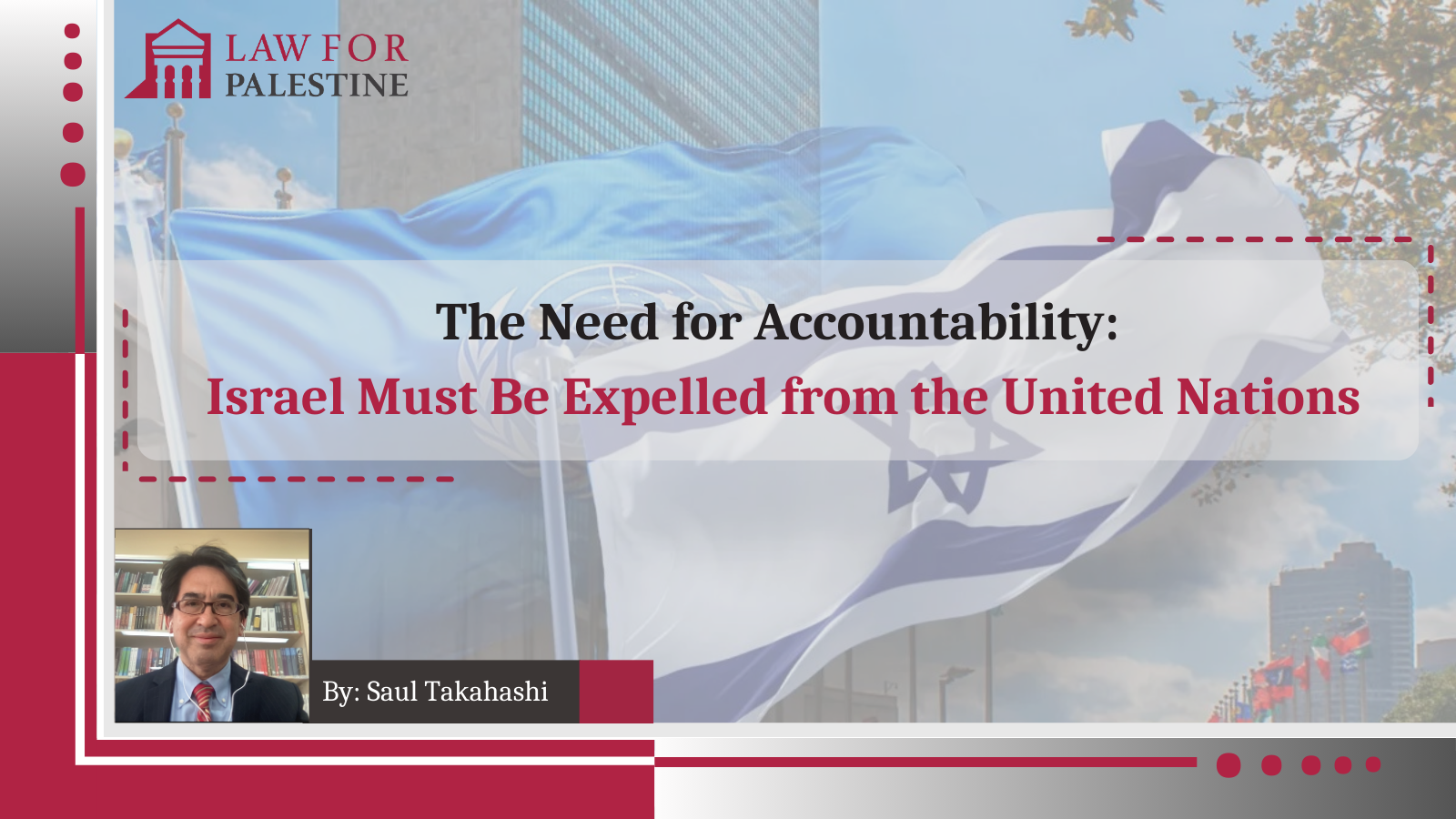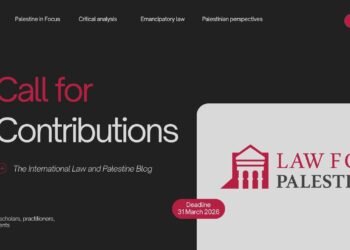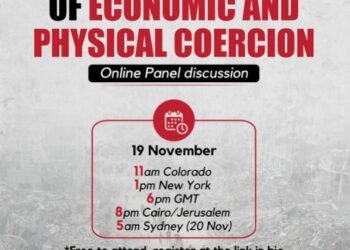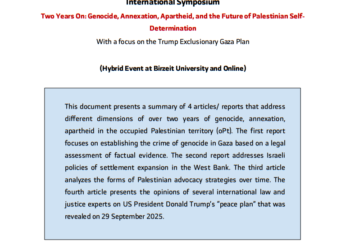The Need for Accountability: Israel Must Be Expelled from the United Nations [1]
Author: Saul Takahashi
Professor of Human Rights and Peace Studies, Osaka Jogakuin University. Deputy Head of Office of the UN High Commissioner for Human Rights in the occupied Palestinian territory from 2009 to 2014
Editors: Henriette Willberg and N. Chowdhury
-
Introduction
In January 2024, the International Court of Justice (ICJ) found it “plausible” that Israel was committing genocide.[2] As provisional measures, the Court ordered Israel to “take all measures within its power” to refrain from violating the 1948 Convention on the Prevention and Punishment of Genocide, and also ordered Israel to “prevent and punish the direct and public incitement to commit genocide”.[3] In a subsequent ruling in March 2024, also on provisional measures, the ICJ reiterated its orders of January and ordered the country to ensure “unhindered provision at scale” of humanitarian aid to all areas of Gaza.[4]
Despite their clearly legally binding nature, Israel has openly flouted the orders of the ICJ; Prime Minister Netanyahu denounced them as “outrageous”, and other government ministers stated that the Court “does not seek justice, but the persecution of the Jewish people.”[5]. Israel has also openly ignored the resolutions of the UN Security Council (UNSC) adopted since October 2023, in particular Resolution 2728, which demanded a month-long ceasefire during Ramadan as well as the lifting of all restrictions on humanitarian aid to Gaza. Like dozens of other UNSC resolutions regarding the situation in Palestine adopted over the decades, Israel has simply refused to comply, without facing any real consequences. In particular, the United States (US) and several other Western countries continue to provide Israel with an endless supply of military, financial, and political support.[6]
In addition to Israel’s recalcitrance in the face of ICJ rulings and UNSC resolutions, the sheer contempt that Israel exhibits for its international legal obligations, and for the institutions of the UN itself, is unprecedented. The UN is facing a crisis: a rogue member state openly refusing to obey the rules and instructions of the organisation, as well as the international order the organisation exists to uphold. Though the situation has accelerated dramatically since October 2023, it is not new; for decades Israel has flouted its obligations, without being held accountable.
The sheer contempt that Israel exhibits for its international legal obligations, and for the institutions of the UN itself, is unprecedented
The UN Charter provides for a remedy when members persistently violate their duties as a member state; namely, expulsion from the organisation. No state has ever been expelled from the UN, though there was serious discussion in the case of apartheid South Africa. However, there is equally no precedent for Israel’s actions, which at every step have shown not just disregard, but utter scorn, for international law and for the UN.
It is of vital importance that member states of the UN start taking immediate steps towards expelling Israel under the UN Charter. Expulsion from the UN is not only warranted in this case, but is imperative, as it is the only way to ensure the legitimacy of international law, and of the UN itself. Should expulsion prove politically difficult, due to the veto power Israel’s allies – in particular, the US – wield in the UNSC, member states should, at least as a first step, de facto suspend Israel from the UNGA, as was done in the case of South Africa.
-
Israeli refusal to comply with its UN Charter obligations, in particular UNSC resolutions
Article 4 of the UN Charter states that membership is open to all “peace loving states which accept the obligations” in the Charter. Included amongst those obligations is the obligation, stipulated in Article 25 of the Charter, to “accept and carry out” the decisions of the Security Council
Article 6 of the Charter states that a member state that “has persistently violated the Principles contained in the present Charter may be expelled … by the General Assembly upon the recommendation of the Security Council”.[7] There is no explicit link in Article 6 to Article 25, and one could definitely argue that Israel’s long-standing violations of the principles of the UN – in particular the “principle of equal rights and self-determination” (Article 1.2) and “respect for human rights and for fundamental freedoms for all without distinction as to race” (Article 1.3) – already provide grounds for expulsion under Article 6. Nevertheless, Article 25 provides clearer reasoning for why Israel must be held to account for its violation of its Charter obligations.
Article 6 of the Charter states that a member state that “has persistently violated the Principles contained in the present Charter may be expelled … by the General Assembly upon the recommendation of the Security Council”
Israel has for decades been a serial violator of UNSC resolutions. The relentless Israeli colonisation of the West Bank violates numerous UNSC resolutions, including Resolution 242 (1967), which “[emphasises] the inadmissibility of the acquisition of territory by war”, language which, by and large, is repeated in numerous further resolutions, such as 252 (1968); 267 (1969); 271 (1969); 298 (1971); 478 (1980); 681 (1990); and 2324 (2016).
That Israel is in violation of this principle of international law was reiterated clearly by the ICJ in its July 2024 Advisory Opinion, where it stated Israeli policies and practices “amount to annexation of large parts of the Occupied Palestinian Territory … [and are therefore] contrary to the prohibition of the use of force in international relations and its corollary principle of the non-acquisition of territory by force.”[8] The ICJ states clearly that Israel’s presence in the 1967 territories is unlawful, and that all states must implement measures to bring the occupation to an end.[9]
Israeli colonisation of the West Bank (which includes East Jerusalem) has been ongoing without interruption, in open defiance of UNSC resolutions, since Israel occupied the territory in 1967. As of September 2023, there were approximately 700,000 Israeli colonial settlers in the West Bank.[10] Israel’s population is approximately 9.2 million; approximately 20% of that figure comprises Palestinians with Israeli citizenship (“48 Palestinians”), who are de facto barred from living in Israeli colonies in the West Bank. In other words, nearly 10% of Jewish Israelis live in colonies in the West Bank, in blatant violation of international law.
Likewise, Israel’s unilateral annexation of East Jerusalem openly violates numerous UNSC resolutions, including 252 (1968); 267 (1969); 271 (1969); 298 (1971); 476 (1980); 478 (1980); 672 (1990); and 2324 (2016). Resolution 252 states in clear terms that “all legislative and administrative measures taken by Israel, including expropriation of land and properties thereon, which tend to change the legal status of Jerusalem are invalid and cannot change that status”.
To cite just a recent example of UNSC condemnation of Israeli colonisation, in 2016, the Security Council adopted Resolution 2334:
Condemning all measures aimed at altering the demographic composition, character and status of the Palestinian Territory occupied since 1967, including East Jerusalem, including, inter alia, the construction and expansion of settlements, transfer of Israeli settlers, confiscation of land, demolition of homes and displacement of Palestinian civilians, in violation of international humanitarian law and relevant resolutions … 1. Reaffirms that the establishment by Israel of settlements in the Palestinian territory occupied since 1967, including East Jerusalem, has no legal validity and constitutes a flagrant violation under international law …; 2. Reiterates its demand that Israel immediately and completely cease all settlement activities in the occupied Palestinian territory, including East Jerusalem, and that it fully respect all of its legal obligations in this regard.
Israel has, of course, not complied with these Resolutions. The country made no effort to hide its intentions at the Security Council in 2016, calling Resolution 2334 the “peak of hypocrisy. The Council had wasted time to condemn Israel for building homes in the Jewish people’s historic homeland. …Today [the Council] had voted to condemn the State of Israel and to condemn the Jewish people for building homes in the Land of Israel. Asking every voting member who had given them the right to issue such a decree, denying ‘our eternal rights in Jerusalem’, [the Israeli Ambassador] expressed full confidence in the justice of Israel’s cause and the righteousness of its path.”[11]
Other UNSC resolutions Israel has flouted without consequence demand compliance by Israel with standards of international humanitarian law, in particular the Fourth Geneva Convention applicable in situations of occupation (See resolutions 446 (1979); 468 (1980); 468 (1980); 471 (1980); 478 (1980); 484 (1980); 592 (1986); 605 ((1987); 607 (1988); 636 (1989); 672 (1990); 673 (1990); 681 (1990); 694 (1991); 726 (1992); 799 (1992); 904 (1994); 1322 (2000),; 1544 (2004); and 2334 (2016)), and also demand protection for Palestinian civilians (See resolutions 607 (1986); 636 (1989); 681 (1990); 694 (1991); 726 (1992); 799 (1992); 904 (1994); 1073 (1996); and 1322 (2000)).
-
Israeli refusal to comply with other international legal obligations
Besides its refusal to abide by the decisions of the UNSC, Israel is a serial violator of international law. Israel maintains a system of apartheid and/or racial segregation over at least the 1967 territories, aiming to ensure Israeli dominance over Palestinians in all walks of life. That the Israeli regime amounts to apartheid has been recognized by UN Special Rapporteurs of the Human Rights Council,[12] as well as by the ICJ, which in its July 2024 Advisory Opinion noted that Israel’s policies and practices constitute a violation of the prohibition of apartheid and racial segregation in the International Convention on the Elimination of All Forms of Racial Discrimination.[13]
Indeed, though the ICJ’s Advisory Opinion is limited to the 1967 territories, there is a strong argument that Israel maintains an apartheid regime over all territories it controls, including within the borders of the 1948 territories (sometimes referred to as “Israel proper”). In 2022, Amnesty International documented how all Palestinians, including Palestinians with Israeli citizenship and Palestinian refugees, face systemic discrimination amounting to apartheid.[14]
Israel’s apartheid regime is an integral part of the country’s illegal occupation of Palestine, which violates the right of the Palestinian people to self-determination. Self-determination is not only the most fundamental human right, without which the exercise of any other right would be practically impossible; it has also been recognized by the ICJ as an “essential principle of contemporary international law”,[15] and as a right erga omnes, i.e. a right all states have an interest in protecting. The ICJ has found that the “sustained abuse by Israel of its position as an occupying power, through annexation and an assertion of permanent control over the [1967 territories] and continued frustration of the right of the Palestinian people to self-determination” has resulted in Israel’s presence in the 1967 territories being unlawful, and that the occupation must be brought to an end “as rapidly as possible”.[16]
Above and beyond these violations, it is well-documented that Israel is a longstanding violator of legal obligations under provisions of international human rights law and international humanitarian law. Countless reports of UN human rights bodies and international and national human rights organizations document how Israel violates the rights of Palestinians on a systemic and widespread basis, including the right to freedom of expression, the right to life, the right to be free from arbitrary detention, and the right to be free from torture, to name just but a few[17]. Violations of human rights are of course hardly unique to Israel, but it is submitted that the systemic nature of Israeli violations, viewed within the context of the longstanding above violations (violations of the Palestinian right to self-determination and the prohibition of apartheid), make the abuses particularly egregious.
-
Israeli defiance of the authority of the UN
Perhaps equally as important, Israel has for decades openly expressed scorn for the UN, criticising it as biased against Israel and even anti-Semitic. The criticism has of course become more vehement since October 2023: in March 2024, for example, the Israeli Foreign Minister called the UN an “anti-semitic and anti-Israeli body that shelters and emboldens terror”.[18] However, the sheer contempt Israel expresses towards the UN is longstanding.
Israel has for decades openly expressed scorn for the UN, criticising it as biased against Israel and even anti-Semitic
With a small number of exceptions, Israel has refused to cooperate with UN human rights procedures or investigations. Special Rapporteurs are routinely lambasted as being “anti-Semitic”, refused entry to Israel (making impossible entry to the West Bank), and have even been detained at Tel Aviv airport.[19] As of September 2024, OHCHR international staff in Palestine have been refused visas by the Israeli government for approximately two years, forcing them to work from neighbouring Jordan.
Since October 2023, Israel has also resorted to lethal, military attacks against the UN. As of 7 October 2024, more than 300 humanitarian workers had been killed by Israeli attacks, the bulk of which were UN staff, in particular staff of the UN Relief and Works Agency (UNRWA), which exists to provide aid to Palestinian refugees.[20] From 7 October 2023 to 13 October 2024, Israel had attacked UNRWA schools and other facilities 464 times, and had killed 228 UNRWA staff.[21]
UNRWA has for years been the subject of Israeli vitriol, with Israel regularly levelling spurious accusations against the agency of supporting terrorism against Israel. On 26 January 2024, hours after the ICJ announced its finding that Israel was plausibly committing genocide and ordered provisional measures, Israel claimed it had evidence that a dozen UNRWA staff members had been personally involved in the 7 October attacks on Israel. Within ten days, the British press reported that there was no substance to the Israeli allegations (Channel 4, 2024), and the independent commission established to review the allegations (which throughout received no cooperation from the Israeli government) stated on 22 April 2024 that Israel had failed to provide any specific evidence.[22]
Bills currently in the Israeli parliament would cancel the diplomatic privileges and immunities UNRWA is legally entitled to as a UN agency, and might force the organisation to terminate its operations in East Jerusalem. Earlier language (which passed the first reading in parliament) in the bills would have designated UNRWA as a terrorist organisation. The Israeli government has already announced the expropriation of the UNRWA compound in East Jerusalem.[23] These actions by Israeli political leaders are indicative of the overall disdain of the Israeli government towards UNRWA, and towards the UN in general. In a further offence against the legitimacy of the UN, in addition to attacking UNRWA, Israel has also launched repeated attacks against UN Peacekeeping forces in Lebanon since invading that country in October 2024, resulting in several injuries.[24]
-
The South Africa case – unseated from the UNGA
No member state has ever been expelled or suspended from the UN. However, the organisation came very close to taking action under Article 25 in the case of apartheid South Africa – a case with obvious parallels to that of Israel. The trigger for that debate at the UN was not only the growing international opprobrium towards South Africa regarding apartheid, but also its continuing illegal occupation of Namibia.
In 1969, the UNSC adopted Resolution 269, stating in its preamble that it was “[m]indful of its responsibility to take necessary action to secure strict compliance with the obligations entered into by States Members of the United Nations under the provisions of Article 25 of the Charter”. The Council went on to condemn South Africa for its refusal to comply with previous UNSC resolutions and “for its persistent defiance of the authority of the United Nations” (emphasis added), and further “[decided] that the continued occupation of the Territory of Namibia constitutes an aggressive encroachment on the authority of the United Nations, a violation of the territorial sovereignty and denial of the political integrity of the people of Namibia” (emphasis added). It is noteworthy that the UNSC condemned South Africa not only for the country’s noncompliance with its resolutions, but for its lack of respect for the authority of the organisation – a lack of respect shown, likewise, by Israel.
South Africa refused to comply and in 1970, the UNSC requested the ICJ for an Advisory Opinion on the legal consequences of Namibia’s continuing occupation. Though South Africa had argued, inter alia, that UNSC resolutions were only binding if they had been adopted under Chapter VII of the Charter, the ICJ struck down that view, stating succinctly: “when the Security Council adopts a decision … it is for Member States to comply with that decision, including those members of the Security Council which voted against it and those Members of the United Nations who are not members of the Council. To hold otherwise would be to deprive this principal organ of its essential functions and powers under the Charter.”[25] The Court then added:
A binding determination made by a competent organ of the United Nations to the effect that a situation is illegal cannot remain without consequence. Once the Court is faced with such a situation, it would be failing in the discharge of its judicial functions if it did not declare that there is an obligation, especially upon Members of the United Nations, to bring that situation to an end.[26]
The Court did find that an assessment of the language contained in a particular resolution was necessary to ascertain its binding nature, and suggested that the UNSC’s specific mention of Article 25 in Resolution 269 was important in its determination that the Resolution created legal obligations. However, it is submitted that the strong language used, for example, in Resolution 2334, is equally clear and unambiguous, and is clearly meant to impose an obligation to act on the offending state – in this case, Israel.
Despite this momentum, South Africa was not expelled from the UN. On 30 October 1974, the three western Permanent Members of the UNSC – the US, the UK, and France – all opposed expulsion, making further action by the UNSC impossible.
Faced with inertia at the UNSC, the UNGA took matters into its own hands. The UNGA had, since 1970, annually voted to reject the credentials of the South African delegation, on the basis that the delegation of the apartheid government did not represent the country’s population. That action was not based on the Charter, but on the Rules of Procedure of the UNGA, thereby manoeuvring around the Charter requirement of an UNSC recommendation for expulsion or suspension. The UN Legal Counsel disagreed with the UNGA’s measure, stating in 1970 that it amounted to a suspension of a member state not explicitly provided for in the UN Charter.[27] As a result, the South African delegation had been allowed to participate in the UNGA, regardless of the rejection of their credentials.
South Africa was excluded from the UNGA, until the dismantling of apartheid in the 1990s.
However, subsequent to the 1974 UNSC debate, the President of the UNGA decided that the repeated refusal of the UNGA to accept the South African credentials was “tantamount to saying in explicit terms that that the [UNGA] refuses to allow the delegation of South Africa to participate in its work.”[28] That decision of the President was ratified overwhelmingly by the UNGA, with 91 states voting in favour, 22 against, and 19 abstentions. In what the UNGA itself would later describe as a “moral and political decision” (Resolution 50/49 (1995)), South Africa was therefore excluded from the UNGA, until the dismantling of apartheid in the 1990s.
Some academics argue that the use of the credential procedure for such purposes is contentious. Schermers and Blokker, for example, state that it is “erroneous”, and lament that while “Western countries reject [it] … other countries are mostly in favour of it. Since these other countries constitute a majority in universal organisations, the credentials procedure has been used … for this purpose.”[29]
However, Jhabvala argues forcefully that the credential process could never be a purely technical one. Rather, the process would always entail political decisions by member states regarding the legitimacy of particular regimes.[30] It should also be stressed, as recently argued by Jamshidi, that excluding a member state from the UNGA on the basis of its credentials (or lack thereof) is a different procedure entirely from suspension or expulsion under the Charter, and, legally and institutionally, does not necessarily have implications for those processes. The argument that there is a conflict between using the credentials process in that manner on the one hand, and those Articles of the Charter on the other, is questionable at best.[31]
-
Conclusion
There is an urgent need to hold Israel accountable for its longstanding violations of international law. This includes not only independent and collective sanctions, but also the exclusion of Israel from the club of “peace loving nations” that, according to the UN Charter, the organisation should be.
Expelling Israel is vital not only because the UN exists to uphold international law, but also to maintain the UN’s integrity as an organisation. The current situation, where Israel openly violates resolutions of the UNSC, scorns binding orders of the ICJ, and physically attacks UN premises and staff, is a clear danger to the authority of the UN – a point which the UNSC raised explicitly in the case of South Africa. In that regard, it is notable that the UNGA, in its Resolution ES-10/24 subsequent to the July 2024 Advisory Opinion of the ICJ, stated that it “[s]trongly deplores the continued and total disregard and breaches by the Government of Israel of its obligations under the Charter of the United Nations, international law and the relevant United Nations resolutions, and stresses that such breaches seriously threaten regional and international peace and security” (emphasis added).
Ideally, member states would immediately commence a debate regarding the expulsion of Israel from the UN. Naturally, this author is not unaware of the significant geopolitical difficulties with this route, and the approach taken by the GA in the South African case, i.e. exclusion of Israel on the basis of the accreditation process, may be a practical step forward on an interim basis. Whichever path is taken, it is of supreme importance to the UN, and to the international system as a whole, that Israel be held accountable for its unlawful acts.
References
– Albanese, Francesca,“Situation of Human Rights in the Palestinian Territories Occupied since 1967” (2022) UN Doc A/77/356, 21 September 2022.
– Amnesty International, ‘Israel/OPT: Israeli air strikes that killed 44 civilians further evidence of war crimes – new investigation’ (27 May 2024) <https://www.amnesty.org/en/latest/news/2024/05/israel-opt-israeli-air-strikes-that-killed-44-civilians-further-evidence-of-war-crimes-new-investigation/> accessed 21 October 2024.
– Amnesty International, Israel’s Apartheid against Palestinians: Cruel Domination and Crime against Humanity (Amnesty International, 2022).
– Anadolu Agency, “Palestine slams Israeli bill to designate UN refugee agency as ‘terrorist organization’” (22 July 2024) <https://www.aa.com.tr/en/middle-east/palestine-slams-israeli-bill-to-designate-un-refugee-agency-as-terrorist-organization-/3282540> accessed 21 October 2024.
– Falk, Richard; Dugard, John; and Lynk, Michael, Protecting Human Rights in Occupied Palestine: Working Through the United Nations (Clarity Press, 2022).
– Human Rights Watch, ‘Gaza: Israel Attaching Known Aid Worker Locations’ (14 May 2024) <https://www.hrw.org/news/2024/05/14/gaza-israelis-attacking-known-aid-worker-locations> accessed 21 October 2024.
– Human Rights Watch, A Threshold Crossed: Israeli Authorities and the Crimes of Apartheid and Persecution (Human Rights Watch, 2021).
– International Court of Justice (2024a) Legal Consequences arising from Israeli Policies and Practices in the Occupied Palestinian Territory, including East Jerusalem (2024) (Advisory Opinion),[19 July 2024].
– International Court of Justice (2024b),Application of the Convention on the Prevention and Punishment of the Crime of Genocide in the Gaza Strip: South Africa v. Israel (Provisional Measures)[26 January 2024].
– International Court of Justice (2024c), Second Order on Provisional Measures, Application of the Convention on the Prevention and Punishment of the Crime of Genocide in the Gaza Strip: South Africa v. Israel (Provisional Measures) [8 March 2024].
– International Court of Justice, Legal Consequences for States of the Continued Presence of South Africa in Namibia (South West Africa), notwithstanding Security Council Resolution 276 (1970) (Advisory Opinion) [1971] ICJ Rep 16.
– Jamshidi, Mariam, “Unseating the Israeli Government from the UN General Assembly in case of noncompliance with the Advisory Opinion of 19 July 2024” (Verfassungblog, 15 October 2024),<https://verfassungsblog.de/unseating-the-israeli-government-from-the-un-general-assembly-in-case-of-non-compliance-with-the-advisory-opinion-of-19-july-2024/> accessed 21 October 2024.
– Jhabvala, Farrokh,“The Credentials Approach to Representation Questions in the U.N. General Assembly” (1977)7 California Western International Law Journal 615.
– Lynk, Michael,“Report of the Special Rapporteur on the situation of human rights in the Palestinian territories occupied since 1967” (12 August 2022) UN Doc A/HRC/49/87.
– Masters, Jonathan and Marrow, Will ‘US Aid to Israel in Four Charts’, Council on Foreign Relations, (31 May 2024) <https://www.cfr.org/article/us-aid-israel-four-charts> accessed 23 October 2024.
– Office of the United Nations High Commissioner for Human Rights, “State of Palestine: Israeli settlements in the Occupied Palestinian Territory, including East Jerusalem, and in the occupied Syrian Golan” (March 2024) UN Doc A/HRC/55/72 .
– Dettmer, Jamie,‘Netanyahu can’t get Israel’s far right to zip it’ Politico (2 February 2024) <https://www.politico.eu/article/netanyahu-cant-get-israels-far-right-to-zip-it-icj-court-gaza/> accessed 16 October 2024.
– Schermers, Henry G and Blokker, Niels M,International Institutional Law ( Brill, 2018).
– Staff, Toi, Smotrich: It may be ‘justified’ to starve 2 million Gazans, but world won’t let us’ Times of Israel (5 August 2024) <https://www.timesofisrael.com/smotrich-it-may-be-justified-to-starve-2-million-gazans-but-world-wont-let-us/> accessed 16 October 2024.
– United Nations, “‘Yet another’ Israeli strike on peacekeepers’ position in southern Lebanon” (UN News, 16 October 2024) <https://news.un.org/en/story/2024/10/1155801> accessed 21 October 2024.
– United Nations,‘Israel’s Settlements Have No Legal Validity, Constitute Flagrant Violation of International Law, Security Council Reaffirms’ Press Release (23 December 2016) <https://press.un.org/en/2016/sc12657.doc.htm> accessed 21 October 2024.
– United Nations General Assembly, ‘Credentials of Representatives of the Twenty-fifth Session of the General Assembly’ (11 November 1970) UN Doc A/8160.
– United Nations Office for the Coordination of Humanitarian Affairs (2024a): ‘One year of unimaginable suffering since the 7 October attack’ (7 October 2024) <https://www.unocha.org/news/one-year-unimaginable-suffering-7-october-attack> accessed 21 October 2024.
– United Nations Relief and Works Agency,‘Situation Report #143 on the Situation in the Gaza Strip and the West Bank, including East Jerusalem’ (16 October 2024).
* Law for Palestine bears no responsibility for the content of the articles published on its website. The views and opinions expressed in these articles are those of the authors and do not necessarily reflect the official policy or position of the Organisation. All writers are encouraged to freely and openly exchange their views and enrich existing debates based on mutual respect.
Footnotes
[1] This paper builds on a posting by the author on OpinioJuris.com, ‘Rethinking International Law after Gaza: Israel Must be Expelled from the United Nations’ (9 October 2024) at https://opiniojuris.org/2024/10/09/israel-must-be-expelled-from-the-united-nations/.
[2] Order on Provisional Measures, Application of the Convention on the Prevention and Punishment of the Crime of Genocide in the Gaza Strip: South Africa v. Israel (Provisional Measures) [26 January 2024].
[3] ibid [78]-[79].
[4] Second Order on Provisional Measures, Application of the Convention on the Prevention and Punishment of the Crime of Genocide in the Gaza Strip: South Africa v. Israel (Provisional Measures), [8 March 2024 [45].
[5] Jamie Dettmer, ‘Netanyahu can’t get Israel’s far right to zip it’ Politico (2 February 2024) <https://www.politico.eu/article/netanyahu-cant-get-israels-far-right-to-zip-it-icj-court-gaza/> accessed 16 October 2024.
[6] See, e.g., Jonathan Masters and Will Marrow, ‘US Aid to Israel in Four Charts’, Council on Foreign Relations, (31 May 2024) <https://www.cfr.org/article/us-aid-israel-four-charts> accessed 23 October 2024.
[7] Article 5 of the UN Charter provides for suspension of a member state, in cases where the UNSC has taken “preventive or enforcement action” against that state. As with expulsion under Article 6, invoking this Article requires a UNSC recommendation.
[8] Advisory Opinion, Legal Consequences arising from Israeli Policies and Practices in the Occupied Palestinian Territory, including East Jerusalem (2024) (Advisory Opinion) [2024] ICJ Rep, [19 July 2024] [179].
[9] ibid [279].
[10] OHCHR, ‘State of Palestine: Israeli settlements in the Occupied Palestinian Territory, including East Jerusalem, and in the occupied Syrian Golan’ (March 2024) UN Doc A/HRC/55/72.
[11] United Nations, ‘Israel’s Settlements Have No Legal Validity, Constitute Flagrant Violation of International Law, Security Council Reaffirms’, (23 December 2016) <https://press.un.org/en/2016/sc12657.doc.htm> accessed 21 October 2024.
[12] UNGA, ‘Report of the Special Rapporteur on the situation of human rights in the Palestinian territories occupied since 1967, Francesca Albanese’ (21 September 2022) UN Doc A/77/356; OHCHR, ‘Report of the Special Rapporteur on the situation of Human Rights in the Palestinian territories occupied since 1967, Micahel Lynk’ (12 August 2022) UN Doc A/HRC/49/87.
[13] Advisory Opinion, Legal Consequences arising from Israeli Policies and Practices in the Occupied Palestinian Territory, including East Jerusalem (2024) (Advisory Opinion) [2024] ICJ Rep, [19 July 2024] [179].
[14] Amnesty International, (2022): Israel’s Apartheid against Palestinians: Cruel Domination and Crime against Humanity (Amnesty International, 2022).
[15] Advisory Opinion, Legal Consequences arising from Israeli Policies and Practices in the Occupied Palestinian Territory, including East Jerusalem (2024) (Advisory Opinion) [2024] ICJ Rep [19 July 2024] [232].
[16] ibid [261], [267].
[17] See, e.g., OHCHR, Human rights situation in the Occupied Palestinian Territory, including East Jerusalem, and the obligation to ensure accountability and justice (13 February 2023) UN Doc A/HRC/52/75; Amnesty International, Israel’s Apartheid against Palestinians: Cruel Domination and Crime against Humanity (Amnesty International, 2022); Al-Haq, Israeli Apartheid: Tool of Zionist settler Colonialism (Al-Haq, 2022).
[18] ToI Staff, ‘Smotrich: It may be ‘justified’ to starve 2 million Gazans, but world won’t let us’, Times of Israel (5 August 2024) <https://www.timesofisrael.com/smotrich-it-may-be-justified-to-starve-2-million-gazans-but-world-wont-let-us/> accessed 16 October 2024.
[19] See e.g. Richard Falk, John Dugard and Michael Lynk, Protecting Human Rights in Occupied Palestine: Working Through the United Nations (Clarity Press, 2022).
[20] OCHA, ‘One year of unimaginable suffering since the 7 October attack’ (7 October 2024) <https://www.unocha.org/news/one-year-unimaginable-suffering-7-october-attack> accessed 21 October 2024.
[21] UNRWA, ‘Situation Report #143 on the Situation in the Gaza Strip and the West Bank, including East Jerusalem’ (16 October 2024).
[22] Independent Review Group on the UNRWA, ‘Final Report for the United Nations Secretary-General’, ‘Independent Review of Mechanisms and Procedures to Ensure Adherence by UNRWA to the Humanitarian Principle of Neutrality’ (20 April 2024) <https://www.un.org/sites/un2.un.org/files/2024/04/unrwa_independent_review_on_neutrality.pdf> accessed 21 October 2024.
[23] Noa Shpigel and Jonathan Lis, ‘Israel eexpected to pass laws targeting UNRWA next week despite lack of replacement’ Ha’aretz (25 October 2024) <[https://www.haaretz.com/israel-news/2024-10-25/ty-article/.premium/israel-expected-to-pass-laws-targeting-unrwa-next-week-despite-lack-of-replacement/00000192-c3b3-da18-a797-e3fb52950000> accessed 26 October 2024; Awad al-Rujoub, ‘Palestine slams Israeli bill to designate UN refugee agency as ‘terrorist organization’ Andalou Agency (22 July 2024) <https://www.aa.com.tr/en/middle-east/palestine-slams-israeli-bill-to-designate-un-refugee-agency-as-terrorist-organization-/3282540> accessed 21 October 2024.
[24] United Nations, ‘Yet another’ Israeli strike on peacekeepers’ position in southern Lebanon’ UN News, (UN News, 16 October 2024) <https://news.un.org/en/story/2024/10/1155801> accessed 21 October 2024.
[25] Advisory Opinion, Legal Consequences for States of the Continued Presence of South Africa in Namibia (South West Africa), notwithstanding Security Council Resolution 276 (1970) (Advisory Opinion) [1971] ICJ Rep 16 [116].
[26] ibid [117].
[27] UNGA, ‘Credentials of Representatives of the Twenty-fifth Session of the General Assembly’ (11 November 1970) UN Doc A/8160.
[28] Farrokh, Jhabvala, ‘The Credentials Approach to Representation Questions in the UN General Assembly’ (1977) 7 California Western International Law Journal 615.
[29] Henry Schermer and Niels Blokker, International Institutional Law (Brill 2018) 222.
[30] Farrokh Jhabvala, ‘The Credentials Approach to Representation Questions in the UN General Assembly’ (1977) 7 California Western International Law Journal 615, 637.
[31] Mariam Jamshidi, ‘Unseating the Israeli Government from the UN General Assesmbly in case of noncompliance with the Advisory Opinion of 19 July 2024’ (Verfassungblog, 15 October 2024),<https://verfassungsblog.de/unseating-the-israeli-government-from-the-un-general-assembly-in-case-of-non-compliance-with-the-advisory-opinion-of-19-july-2024/> ( accessed 21 October 2024).
Law for Palestine – The Need for Accountability: Israel Must Be Expelled from the United Nations







